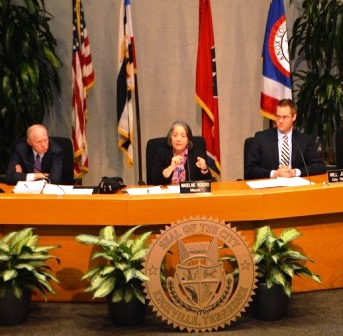Mayor Madeline Rogero explained the history of the Magnolia Avenue Streetscapes project Tuesday evening and invited opponents to meet with her. (Photo by Dan Andrews)
By Mike Steely
After about 9 years of planning, meetings, public hearings, and lots of publicity in the media the initial renovation of some six blocks along Magnolia Avenue is getting some late and very vocal objections from some nearby residents.
The main objection, it seems, is that the proposed project passes through one of Knoxville’s traditional African-American neighborhoods but some of those voices haven’t been heard. The idea of beginning the project at the western end of Magnolia, the part closest to downtown, is also being questioned by some citizens.
Mayor Madeline Rogero used her “Mayor’s Report” Tuesday evening to try to counter some of the complaints and to give a background on the project and how the community has been involved in the planning.
Eventually the project would stretch beyond those six blocks and run from Jessamine Street all the way to the Burlington neighborhood, but those long range plans don’t satisfy some residents.
Given the loud protests in the council meeting earlier this month, the council Tuesday heard from eight protesters who signed up to speak in the public forum at the end of the meeting. But before they spoke Mayor Rogero delivered a statement:
“I want to sit down and meet with those of you who are concerned about the Magnolia Avenue Streetscapes. I’ll come to you or you can come to me,” she began.
“I want to give some historical context to it,” she said, noting that she has been involved in the project since 2006 when she served as Community Development Director. Rogero went on to give the history of the project when there were larger federal dollars available during the first decade of the 2000’s.
She spoke about the Career Center at Pellissippi State, redevelopment at Five Points, rebuilding of Paul Hogue Park, Walter P. Taylor Homes, small business loans, tax incentives and a blighted properties program.
She said that the federal dollars have “gone away” but the city has increased its dollars for East Knoxville. Rogero said that the city continued to try to focus on Magnolia Avenue while also working on the South Waterfront redevelopment plan, the Cumberland Avenue project along with Broadway, Central Avenue and Downtown redevelopment.
“We were focusing on North, West and South and there was a demand from the community that we heard,” she said of East Knoxville seeking city help. She added “There were no dollars in the city budget. If you do a plan and then don’t implement it people are going to be pretty disappointed.”
As Director of Community Development, Rogero said the city, along with Magnolia Avenue merchants and the Metropolitan Planning Commission, began looking at developing a project.
“There were a lot of public meetings. Forty to one hundred people would come to those meetings. The result is the Magnolia Avenue Corridor Plan,” she said, adding, that plan was vetted, it went to MPC and was unanimously adopted by MPC.
“It went to city council and Bob Becker (Director of the Beck Center and a former councilman) made the motion to approve it. Chris Woodhull voted for it,” she said.
“There was no public opposition at the time,” the mayor said.
In 2013, as Mayor, Rogero put funding in the budget to begin the process to restore Magnolia Avenue starting with the Streetscape Project.
“You have strength when you develop from the inside out,” she said.
“We started working on the commercial corridors that extend from downtown,” she said.
“We’ve got to start somewhere,” Mayor Roger stated, adding, “Then you move out from there.”
“We entered this in all good faith,” she said, explaining the city’s work with the Urban League and other organizations in East Knoxville.
“I understand the issues that you are raising,” she said. The mayor said she is looking how at the city can revitalize a neighborhood without displacing residents.
“How can we work together?” she asked.
At the end of the council meeting, after dealing with various other issues, the talk turned back to the Magnolia Avenue project as the opposition spoke out publically.
Despite the mayor’s comments, several citizens criticized the city’s plans with statements that included the loss of Black Culture, lack of support to local African-American businesses there, funding of other city projects and the chance that the cost of living would increase dramatically.
One speaker suggested that the council should suspend the project and another complained of police harassment after protesting at the earlier council meeting.
One protester even suggested that the promotional materials showing the completed project shows White people on the streets and not African Americans. Another speaker invited the mayor and council to visit the neighborhood and let the residents give them a tour.
David Hayes, of Black Lives Matter, said that East Knoxville is “getting the scraps” of city funding and said the move from downtown outward would move African-Americans out of the neighborhood.
Xavier Jenkins said that while East Knoxville suffers from roads with potholes, West Knoxville has “yellow brick roads.” While he welcomed a meeting with the mayor he said, “Selling us hopes and dreams doesn’t work.”






